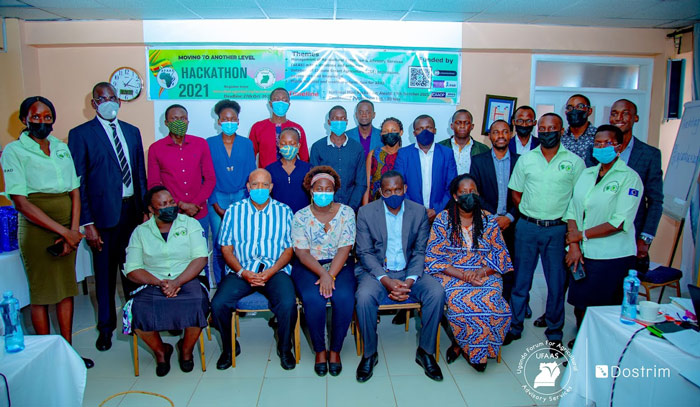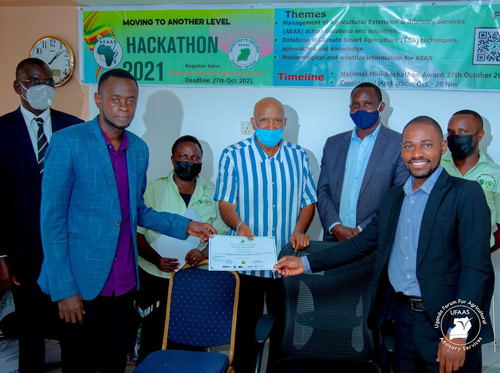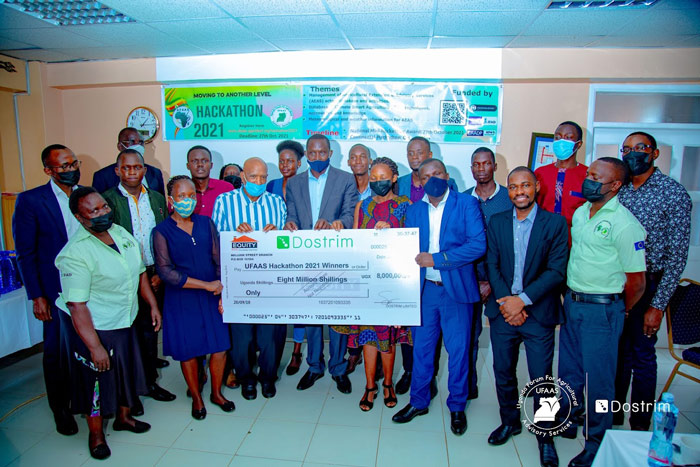
The Uganda Forum for Agricultural Advisory Services (UFAAS) and Dostrim Limited jointly organised for the first time a week-long Hackathon under the theme “Digitalizing Agricultural Extension and Advisory Services for Effective Service Delivery”.
Dostrim Limited is an ICT firm, and member of UFAAS’s ICT technical working group under a Sub-grant from the African Forum for Agricultural Advisory Services, CAADPXP4 project.
The Hackathon took place from October 4 to October 11, 2021 and attracted over 40 participants from 18 teams. The teams competed under themes to improve the effectiveness of African knowledge and innovation systems; demand-driven public policies on agricultural research and extension services; enhancing knowledge sharing and technology development for climate change adaptation and mitigation of agriculture and food systems.

Through the event AFAAS sought to promote open source concepts among developers in the agriculture sector as a way to speed up growth of the ICT innovations ecosystem in Africa for improved uptake of Climate-Smart Agricultural Technologies and Practices.
Developers had to find solutions to identified major challenges in agricultural extension and agriculture systems under three themes of Management of Agricultural Extension; Advisory Services actors’ databases and activities; Database of Climate Smart Agriculture techniques, approaches and knowledge; meteorological and weather information systems.
This year, the award ceremony was held on October 27th at Eureka Hotel in Kampala. It was officiated by Dr. Silim Nahdy, AFAAS Executive Director. AFAAS Partnerships, Planning and Learning Specialist, Mr. Max Olupot; Mr Willy Ofwono Osinde, Commissioner at Ministry of Science, Technology and Innovation, and Hackathon judges attended the event.

In his opening remarks, Dr. Nahdy underscored the relevance of technology in ICT in agriculture. He said AFAAS was committed to digitalization to improve the sector. AFAAS will invest more in digitalisation and build capacities of its members in ICTs, Dr. Nahdy said.
UFAAS Chief Executive officer, Mrs. Beatrice Luzobe, applauded all the contestants and commended them for the smart work in providing solutions to challenges in agriculture. She invited contestants to join the UFAAS for networking and learning.
Theme 1: Management of AEAS actors’ databases and activities
Under this category, the winning Team developed a product -Farmer Graphical Directory Services including a graphical map of Uganda with farmers. Farmers represented on the map, may have their hands raised. A hand raised implies a farmer has produce to supply, the farmer details including the type of produce and animal the farmer has are present on the map, as one hovers over a farmer.
When the images show raised hands, it means farmers have produce to supply. This enables quick connection of farmers with buyers. The app also enables a comparison of prices at any time and can provide information on what type of produce a farmer has. The team members were: Gibusiwa Joseph, MutonyiRegine and Magina Denis.
The first runner up, (FarmSoko) presented a product for farmers to conveniently find and book services of AEAS service providers. Farmers access the platform by placing requests via a USSD menu that supports a wide range of mobile phones from basic feature phones to the most sophisticated smartphones. On submission, the platform intelligently evaluates and matches the request to the best possible AEAS worker available.
The AEAS worker in turn receives notification of the job to be done via SMS or Smartphone notification at which point they can accept or decline. Accepting the request triggers a series of activities that include making contact with individuals up till completion of the job. However, on declining the request, the platform widens the search criteria and repeats the process. Team members were: Atukei Maureen and Mamawi Andrew.
Theme 2- Database of CSA techniques, approaches and knowledge
The winning product was AgroAid App developed by Afrosoft IT solutions. This multilingual app has a number of listed agriculture advisors who can be contacted through voice calls, chat, or video calls.
The app also includes an interactive farmers’ forum for sharing experiences and challenges. The AgroAid App and System was designed in a way to enable users to choose their language of preference as they navigate through the system. Languages so far deployed are English, Luganda, Swahili French and Portuguese. In interacting with the systemfor the first time, the user is required to register with just a phone number and password. This is to ease usability especially with rural farmers who may not have an email.
Users are also tasked to choose the line of agriculture they operate i.e. crops or animals and then specify the crops and or animals they deal in. For each animal or crop selected, a farmer is required to feed in how old the crops or animals are. Using the period entered, the AgroAid system is able to provide information on the recommended farming practices, likely diseases and pests. A farmer is able to read in detail about each disease, its causes, how to treat and prevent them. He or she is able to read more farming practices and farming systems.
The AgroAid App has a number of listed Agronomists and Extension workers whom a farmer can ably reach out to through voice call or audios, chat and video calls. The application also comes with a Farmers Forum where subscribed farmers can interact; share their experiences, challenges and advice.
The application also comes with a seven-day weather update to help farmers plan ahead of unfavourable conditions. The App has a Market Intelligence module to help farmers make informed market decisions using Artificial Intelligence. Based on the farmer’s location, provides commodity the prices of various crops and animal product in the various markets close to the farmer. Team members were: Kihunde Christine, Balintuma Isaac, Matovu Joseph, Kalungi Charles, and Katamba Ronald.
Theme 3- Meteorological and weather info systems
Under this theme the winning team developed a Smart Crop Calendar to help improve data collection by using sensors to detect soil moisture, soil water content and document success. Therefore, this project aims primarily to improve data collection using various sensors (soil moisture sensors, soil water content and threshold heat sensors), to reduce on-farm resource wastage, save money, and improve yields using IOT wireless precision irrigation. In addition, the project sought to reduce labour and to increase participation in agriculture among young people. Team members were: Brian Peter Kazibwe, Eric Muhwezi and Emmanuel Semutenga.
The first runner-up AutofarmUg, developed an irrigation system, supplying water to crops through monitored sensor readings to check the volume of water required. This product uses hardware devices and a web application.
The Hackathon was organized by the Uganda Forum for Agricultural Advisory Services – UFAAS in collaboration with Dostrim Limited. It was supported by funding from CAADP-XP4) Project under the Development of Smart Innovation through Research in Agriculture (DeSIRA) financed by the European Union and managed by the International Fund for Agricultural This product has hardware components and a web application Development (IFAD).

Interdisciplinary solutions to the most challenging problems
In his remarks, Mr. Olupot applauded participants for contributing to agriculture. He recognised the various disciplines coming together to develop ideas to solve challenges in agriculture and participating in UFAAs activities. He invited participants to the Africa wide extension week due on November 14 – 20 November 2021.
“It is inspiring to see the engineers coming to agriculture. That is what they call discipline blending, and it is essential. I want to extend to you an invitation to the Agricultural extension week extension week which will take place on November 14 – 20 November 2021 under the theme ‘Effective Agricultural Extension Systems for Sustainable Agripreneurship in Africa,’ he said adding that, “Service is the most important thing and a Hackathon is about a collective effort and willingness to give to community-which you have exhibited. Be simple, flexible and continue with novelty and let us continue to serve farmers together.”
Not all farmers are the same
Mr. Osinde applauded the Hackathon participants and highlighted those that identified the products with the market. He called for the segmentation of farmers to ensure appropriate targeting with advisory services.
“It is difficult to target farmers, generally important to segment them in various categories to enable effective targeting for each of the category,” said Mr. Osinde.
He encouraged the start-ups to reflect on the feedback and get synergies through which they can develop the products further.
“All these efforts, different start-ups and networks are important and are in line with the Government’s National Development Plan (NDP),” he said.

